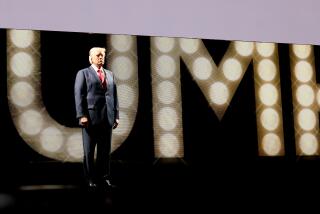Goldberg: Mr. Right eludes the GOP
“If we could just take a little bit from each of them.”
I’ve lost track of how many people I have heard say some version of this in the last couple of months. The “each of them” refers to the final four combatants for the Republican nomination.
You could take Newt Gingrich’s verbal dexterity, encyclopedic grasp of politics and techno-optimism. Add in Rick Santorum’s authenticity and religious conviction. Combine that with the essence of Ron Paul’s principled passion for liberty and limited government. Stir vigorously and then pour into the handsome, squeaky-clean vessel of Mitt Romney (while keeping his business acumen and analytical skill). And voila, you’d have the perfect candidate.
Of course, you could just as easily have aFrankenstein’s monsterwith Gingrich’s verbal pomposity, Santorum’s resentful and dour sanctimony, Paul’s conspiratorial nuttiness and the full suite of Romney’s Stepford Republican qualities. It calls to mind Homer Simpson’s scheme to forcibly mate his pets in a burlap sack so as to create “a miracle hybrid, with the loyalty of a cat and the cleanliness of a dog.”
This is one of the amazing things about the final four. The various factions of the Republican Party and the myriad slices of the conservative mind are represented (with the one obvious missing ingredient being the lack of a Southern evangelical Christian), but none of the pieces is in the right place. It’s like playing with a Mr. Potato Head when the feet are where the ears should be and an arm stands in for a nose.
Santorum is the religious conservative, but he’s a Catholic from Pennsylvania, not a Baptist from Mississippi or Texas. Romney is a devoted family man and business leader running as the authentic outsider, but he’s a Mormon from Massachusetts who seems fake enough to be made from Naugahyde. Paul is the long-overdue libertarian in the GOP field, but he’s an aging holdover from an ideological backwater of libertarianism that dabbled in bigotry and paranoia.
And then there’s Gingrich. The former speaker of the House and leader of the Republican Revolution should be the elder statesman, the insider’s insider. But he’s managed to turn himself into the outsider who wants to fundamentally and profoundly change the world. He’s a Southerner who converted to Catholicism with, as Mark Steyn writes, “twice as many ex-wives as the first 44 presidents combined.” He’s a true political chimera, a Nelson Rockefeller Republican right-wing revolutionary.
This helps explain why GOP primary voters, who are staying home in droves, feel a bit like they woke up in one of those “Twilight Zone” episodes in which they’re the same but everybody else is weirdly different. Each of the candidates offers good reasons to like them, but if you just tilt your head or if the lighting changes, they look unappealing. This is why so many people have started daydreaming about sending the field to a chop shop and rebuilding from scratch.
It’s also why many are talking about a brokered, contested or open convention, even those people — like GOP strategist Karl Rove and radio host Hugh Hewitt — who insist that the chances for such an outcome are, in Rove’s words, as “remote as life on Pluto.”
I don’t buy it.
“You can make up all kinds of scenarios,” Rove explained on “Fox News Sunday.” “But in all likelihood what happens in the dynamic of the primaries, once somebody starts to win they keep on winning.”
Except, as Chris Wallace dryly noted, “Here, nobody keeps winning.” That’s because Republicans keep voting against the front-runners — because they don’t like them.
The naysayers insist we’re stuck with these candidates because that’s the way things are, based on precedent and delegate math.
I see it differently. The experts have been wrong about quite a lot of late — Barack Obama, the tea parties, the Middle East, etc. Heck, Pluto isn’t even a planet anymore.
If these four candidates are unacceptable to a majority of Republicans, they won’t be accepted — and something else will have to happen. What that “something else” will be, I don’t know. But given the state of medical technology, a wild convention seems more plausible than sewing together the good bits from the current pack.
jgoldberg@latimescolumnists.com
More to Read
A cure for the common opinion
Get thought-provoking perspectives with our weekly newsletter.
You may occasionally receive promotional content from the Los Angeles Times.











